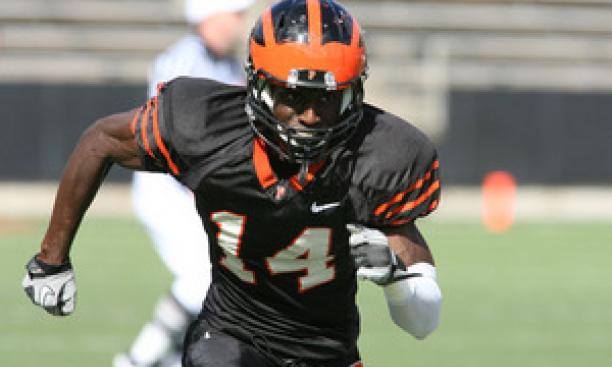

Princeton is counting on Isaac Serwanga '13 to emerge as a top receiver. (Beverly Schaefer)
Only two players who scored touchdowns for 1-9 Princeton last season are returning in 2011.
Quarterback Tommy Wornham ’12, crossed the goal line twice before injury cut short his season. Tailback Brian Mills ’14 did once. The 2010 season exploded because of vast injuries and infinite errors. But if there is going to be a fast turnaround, Coach Bob Surace ’90 is going to need guys who can turn around an opposing linebacker or defensive back.
That means Isaac Serwanga ’13 has to become the wideout he has been challenged to be by Surace, and running backs like Akil Sharp ’13 will need to prove they can be productive. With Mills back, Kevin Navetta ’13 running well through three days of practice, and freshmen Chuck Dibilio, Will Power, and Jon Esposito already convincing Surace they will earn playing time this year, Sharp could be the chair of a committee of up to six tailbacks.
“I think they are all going to help us,” Surace said.
Heaven help the Tigers, however, if Serwanga doesn’t blossom. Converted quarterback Connor Kelly ’14 and junior tight ends Des Smith and Mark Hayes have a chance to be solid complimentary receivers, but they can’t thrive if Serwanga isn’t scaring opponents into double-teaming him.
“Isaac came back in great shape and has made some really good plays,” said Surace Friday after practice. “Tommy is leaning on him now – there’s a trust factor after a summer of working together.
“A guy of that size [6 feet, 3 inches] and range who can get up on a defensive back that quickly, that’s tough to cover. Isaac is bigger than the good corners in the league like our Blake Clemons [’12].
“He still has to be more consistent, there are still some technique things that we’ll get done. But I could tell when he would stop by my office to chat that there was a confidence to him, not a defensiveness like ‘what do I need to do?’ He not only did it, but went above it. I like guys like that.”
Surace adds that NFL scouts who watched Trey Peacock ’11 last season also asked about Serwanga. The coach’s response: “He’s learning, so come back next year. Remember, it didn’t really happen for Trey Peacock until his senior year.”
Alas, after Wornham got hurt against Brown, it never really happened for Peacock like it could have. Despite the team’s losing season, Peacock finished with a league-best 955 receiving yards and was a unanimous All-Ivy pick. Serwanga watched and learned while catching 15 passes for 60 yards.
“As a younger guy I was under Adam Berry, Will Thanheiser and Trey so I see it can be done,” Serwanga said. “Focus to detail is what separates excellence from just OK.”
Sharp, his attention divided between football and track, had been content with being just OK at both until he was asked by Surace to make a choice.
“He had been running track, but he wasn’t winning races, or even coming in second or third,” said the coach. “So I said, ‘Are you on that team just because of girls?’”
“You might be the fifth-best guy at Princeton in the 100 meter dash and still the seventh-fastest football player in the Ivy League. But you aren’t strong enough, you haven’t bought into the weight room.
“He said, ‘I’ve always done track, I don’t want to be a quitter.’ I said, ‘Talk to the coach, if he’s not counting on you I think you can be a really good football player.’”
Only the Sharpest tools in the shed get into Princeton. Sharp took Surace’s advice, chose football full time, and has emerged stronger and more explosive. He also has the team’s fastest 40-yard dash time, and said that he continues to put in extra time, “focusing on getting better.”
Of course, after 1-9, that’s the challenge for far more Tigers than just Serwanga and Sharp. But it is especially necessary this season for those whom Wornham will have to trust with the ball.
